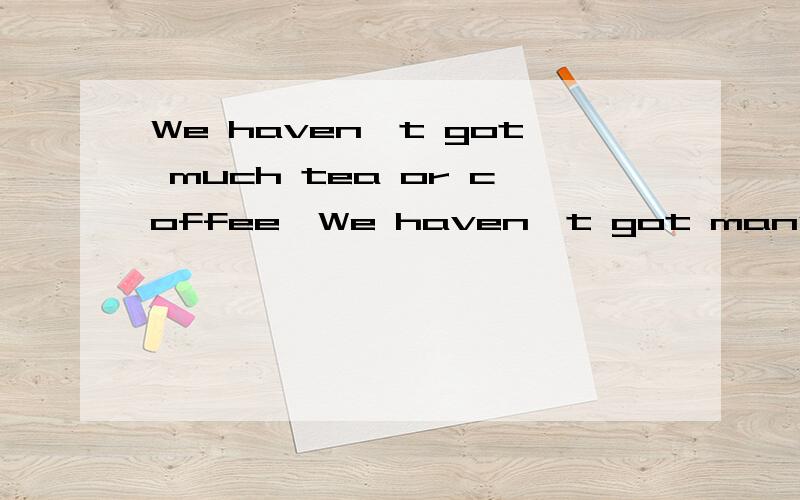We haven't got much tea or coffee,We haven't got many tomatoes,我们番茄不多了,I hope that you've got some money.我希望你还有钱.I haven't got much.我的钱不多了.Well,I haven't got much either!唉,我也不多了.以上课文里的
来源:学生作业帮助网 编辑:作业帮 时间:2024/11/17 22:27:17

We haven't got much tea or coffee,We haven't got many tomatoes,我们番茄不多了,I hope that you've got some money.我希望你还有钱.I haven't got much.我的钱不多了.Well,I haven't got much either!唉,我也不多了.以上课文里的
We haven't got much tea or coffee,
We haven't got many tomatoes,
我们番茄不多了,
I hope that you've got some money.
我希望你还有钱.
I haven't got much.
我的钱不多了.
Well,I haven't got much either!
唉,我也不多了.
以上课文里的句子,不是说否定句要用any吗?为什么还用了much和some?
课文:what do you need?
可以改成:what are we needing?不行的话为什么?
We haven't got much tea or coffee,We haven't got many tomatoes,我们番茄不多了,I hope that you've got some money.我希望你还有钱.I haven't got much.我的钱不多了.Well,I haven't got much either!唉,我也不多了.以上课文里的
因为跟否定形式无关,much后面跟上省略:got much (money)much后用不可数名词
some表示肯定的回答.这里是希望表示向肯定的方面去hope,所以用some
否定句的确可以用any,但是除此以外还可以用many, much
many修饰可数名词,much修饰不可数名词。
如:We haven't got much tea or coffee,
We haven't got many tomatoes
I hope that you've got some money. 此句用some很正常,因为本身就是...
全部展开
否定句的确可以用any,但是除此以外还可以用many, much
many修饰可数名词,much修饰不可数名词。
如:We haven't got much tea or coffee,
We haven't got many tomatoes
I hope that you've got some money. 此句用some很正常,因为本身就是一个肯定句。
need 无论是做实义动词还是情态动词都是没有进行时,即be+needing形式的
收起
呵呵,不要太钻牛角尖,其实这些单词的用法虽有肯定否定的区别,但也不绝对说否定句只用any,肯定句只用some,any.给你举下例子吧:
当any表示“任何”的意义,起强调作用时,它也可以用在肯定句中;
Any student can answer this question.任何学生都可以回答这个问题
但在表示建议,反问,请求的疑问句中,或期望得到肯定回答时,多用some...
全部展开
呵呵,不要太钻牛角尖,其实这些单词的用法虽有肯定否定的区别,但也不绝对说否定句只用any,肯定句只用some,any.给你举下例子吧:
当any表示“任何”的意义,起强调作用时,它也可以用在肯定句中;
Any student can answer this question.任何学生都可以回答这个问题
但在表示建议,反问,请求的疑问句中,或期望得到肯定回答时,多用some而不用any。
Mum, could you give me some money?(妈妈,能给我点钱吗?)
hope that you've got some money.
我希望你还有钱。(这个并不是否定句吧)
其实some一般情况下,不能用于否定句,但是在表示部分否定时还是可以用的。
I don't know some of the students.(这些学生中,有些我不认识)
而many,much都是既可用于肯定也可以用于否定,没有any,some那么强烈的界限
希望对你有帮助哈~~O(∩_∩)O
收起
英语要这么学就累死。以上都是英国英语的说法。
但是不说what we are needing ..... 没理由。。。可以这么说,但是,不地道。仅此而已。